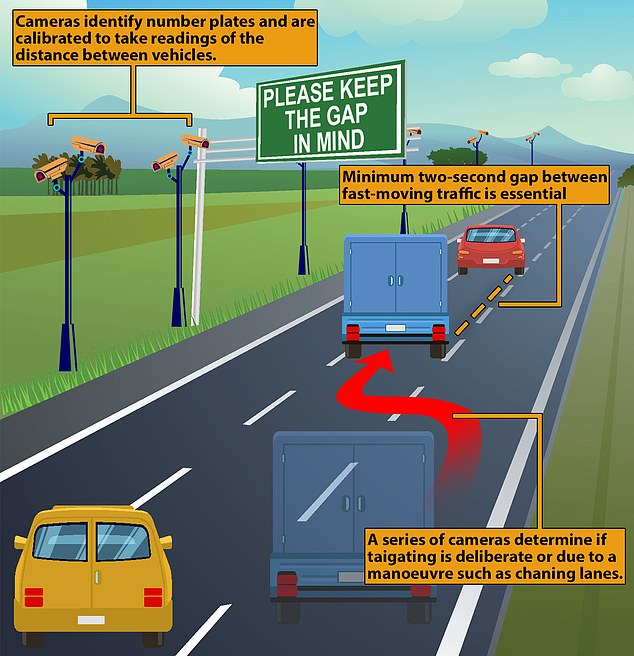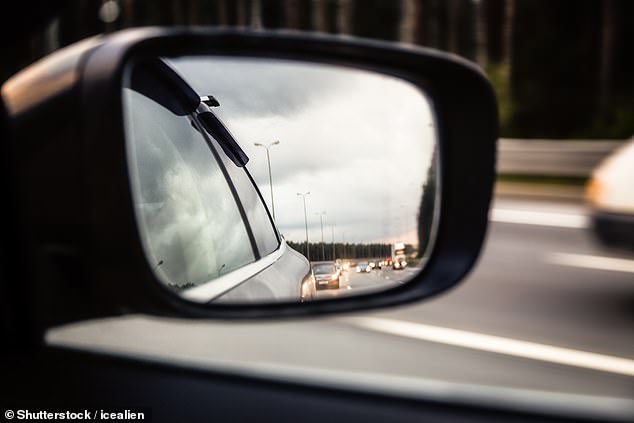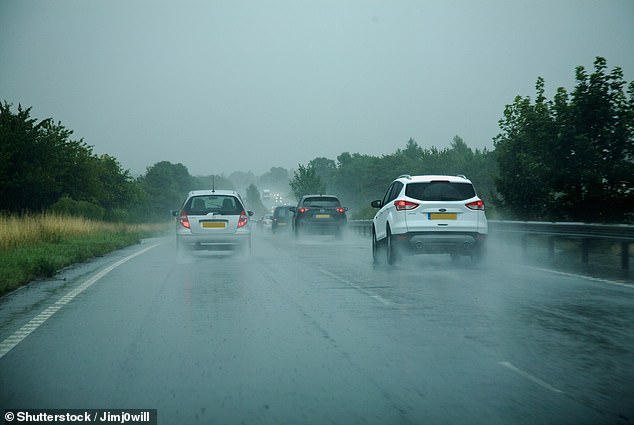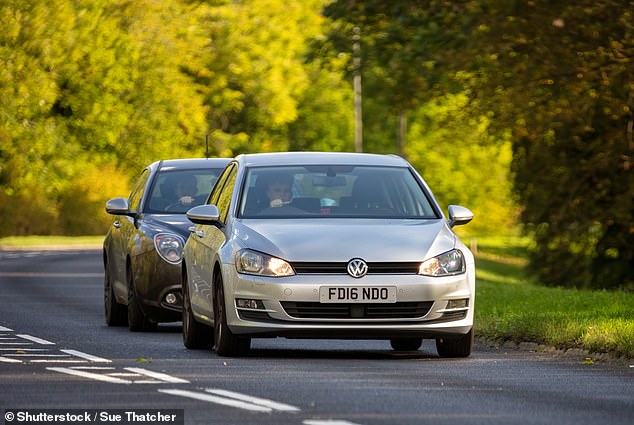Cameras installed on four major motorways to detect dangerous tailgating identified almost one million instances during groundbreaking UK trials, we can exclusively reveal.
National Highways deployed state-of-the-art cameras designed to catch motorists following other vehicles too closely in pilot schemes running between 2017 and 2021.
In total, 844,060 offences were recorded on the stretches of carriageway where the devices were temporarily located.
The figures, obtained from National Highways via a Freedom of Information request by Select Car Leasing and shared with This is Money, have been revealed as drivers are reporting increasing instances of fellow road users sitting too close to their rear bumpers.
In a poll of UK motorists, almost a third say they’re victim to tailgating at least once a week – and half believe the offence has become more prevalent in the last two years.
So, with the technology proving effective and drivers complaining of a rise in aggressive behaviour on the roads, are we set to see a rollout of tailgating cameras in the future? We asked National Highway…

Four trials of tailgating camera technology were deployed between 2017 and 2021
The Government department responsible for the nation’s busiest trunk routes says tailgating is a factor in one in eight crashes on motorways and major A roads.
Dangerous tailgating is a ‘careless driving’ offence, which is punishable by a minimum £100 fine and three points on a driving licence. However, more serious cases involving accidents are dealt with by the courts and potentially lead to a driving ban or even a prison sentence.
Yet it is an offence that typically can only be enforced by officers witnessing instances on the road.
However, between 2017 and 2021, trials took place to measure the ‘capability of the camera technology to detect tailgating behaviour’.
The first was carried out on the M3 over a two-month stint between October and the start of December 2017. Some 237,648 ‘possible offences’ were identified.
A year later, National Highways oversaw a near-12-month trial on the M6, which in 2018 spotted 319,787 cases of dangerous tailgating.
Another year-long pilot on the M20 between 2018 and 2019 registered another 226,282 instances of drivers following too closely, while the last trial on the M1 motorway near Northampton between October 2020 and September 2021 witnessed another 60,343 instances.
Yet despite hundreds of thousands of motorists being caught in the act, no enforcement action was taken against offenders during the trials.
Only in the last trial – which was conducted in partnership with Northamptonshire Police – did repeat offenders get sent warning letters telling them to clean up their act.

Dangerous tailgating is a ‘careless driving’ offence, which is punishable by a minimum £100 fine and three points on a driving licence
Will tailgating cameras be rolled out across the UK?
Following the 2022 trial, National Highways head of road safety, Jeremy Phillips, said: ‘Unfortunately, as highlighted by the M1 trial, we know that too many people are driving too close on our roads.’
However, he attributed ‘most tailgating’ instances as being ‘unintentional’ mistakes by drivers who ‘don’t realise that they are infringing on someone else’s space’.
Despite the successful deployment of camera trials – and the arrival of new roadside devices that can identify tailgating as well as other illegal activity such as drivers using a phone behind the wheel – National Highways told us there are ‘no plans at the present time’ to roll out further trials or to make this type of technology permanent.
When asked if cameras could be used to enforce tailgating endorsements in the future, a spokesman for the Government-operated division told us: ‘This would be a decision for the relevant police forces as the enforcement body.’
They added: ‘Driving too close to the vehicle in front of you makes it difficult to stop in an emergency, and is a factor in one in eight collisions on our network.
‘Safety is our number one priority and we, along with our enforcement colleagues in the police, will continue to explore all opportunities to make our roads safer.’

National Highways previously attributed ‘most tailgating’ instances as being ‘unintentional’ mistakes by drivers who ‘don’t realise that they are infringing on someone else’s space’
Graham Conway, managing director at Select Car Leasing, said drivers would likely welcome camera technology to mitigate the scourge of tailgaters on Britain’s roads.
‘National Highways takes the view that most tailgating is unintentional and perpetrated by drivers who don’t realise that they are infringing on someone else’s space,’ he said.
‘But that’s not how the drivers we surveyed see it. The vast majority – 68 per cent – equate tailgating with a sign of driver aggression.
‘With tailgating a factor in so many accidents, and under the sheer volume of incidents identified by National Highways, a full roll-out of cameras designed to detect – and prosecute – those who get too close to the car in front would surely be welcomed by many motorists here in the UK.’

In a poll of UK motorists, almost a third say they’re victim to tailgating at least once a week – and half believe the offence has become more prevalent in the last two years
Tailgating – an epidemic getting worse every year
A separate Select Car Leasing survey – of 1,000 UK driving licence holders – shines further light on so-called ‘space invaders’ who plague UK roads.
Tailgating was found to be the second worst trigger for road rage (35 per cent of respondents), with ‘being cut up’ taking top spot (39 per cent).
Tailgating also happens with alarming regularity.
Some 28 per cent said they experience it at least once per week, with one in 20 claiming to endure it daily.
Of the respondents surveyed, 49 per cent said tailgating has become a bigger problem in the last 48 months while almost two thirds called for tougher police prosecution.
That said, one in six in the panel revealed they have been spoken to by police regarding tailgating other motorists.













